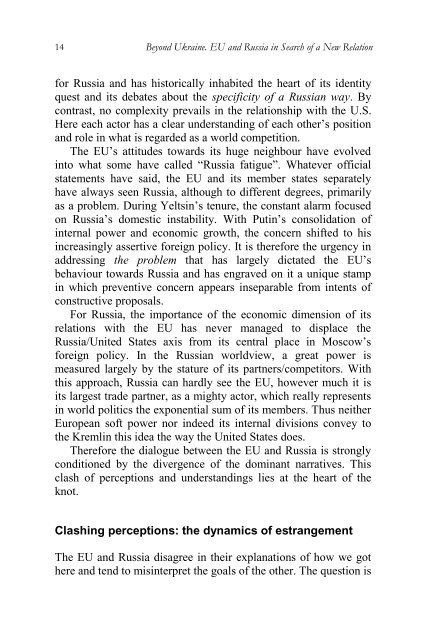beyondukraine.euandrussiainsearchofanewrelation
beyondukraine.euandrussiainsearchofanewrelation
beyondukraine.euandrussiainsearchofanewrelation
Create successful ePaper yourself
Turn your PDF publications into a flip-book with our unique Google optimized e-Paper software.
14 Beyond Ukraine. EU and Russia in Search of a New Relation<br />
for Russia and has historically inhabited the heart of its identity<br />
quest and its debates about the specificity of a Russian way. By<br />
contrast, no complexity prevails in the relationship with the U.S.<br />
Here each actor has a clear understanding of each other’s position<br />
and role in what is regarded as a world competition.<br />
The EU’s attitudes towards its huge neighbour have evolved<br />
into what some have called “Russia fatigue”. Whatever official<br />
statements have said, the EU and its member states separately<br />
have always seen Russia, although to different degrees, primarily<br />
as a problem. During Yeltsin’s tenure, the constant alarm focused<br />
on Russia’s domestic instability. With Putin’s consolidation of<br />
internal power and economic growth, the concern shifted to his<br />
increasingly assertive foreign policy. It is therefore the urgency in<br />
addressing the problem that has largely dictated the EU’s<br />
behaviour towards Russia and has engraved on it a unique stamp<br />
in which preventive concern appears inseparable from intents of<br />
constructive proposals.<br />
For Russia, the importance of the economic dimension of its<br />
relations with the EU has never managed to displace the<br />
Russia/United States axis from its central place in Moscow’s<br />
foreign policy. In the Russian worldview, a great power is<br />
measured largely by the stature of its partners/competitors. With<br />
this approach, Russia can hardly see the EU, however much it is<br />
its largest trade partner, as a mighty actor, which really represents<br />
in world politics the exponential sum of its members. Thus neither<br />
European soft power nor indeed its internal divisions convey to<br />
the Kremlin this idea the way the United States does.<br />
Therefore the dialogue between the EU and Russia is strongly<br />
conditioned by the divergence of the dominant narratives. This<br />
clash of perceptions and understandings lies at the heart of the<br />
knot.<br />
Clashing perceptions: the dynamics of estrangement<br />
The EU and Russia disagree in their explanations of how we got<br />
here and tend to misinterpret the goals of the other. The question is


